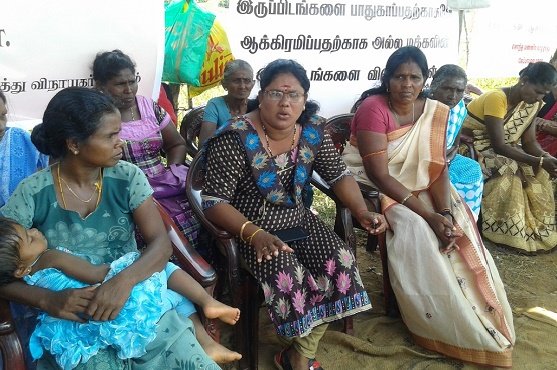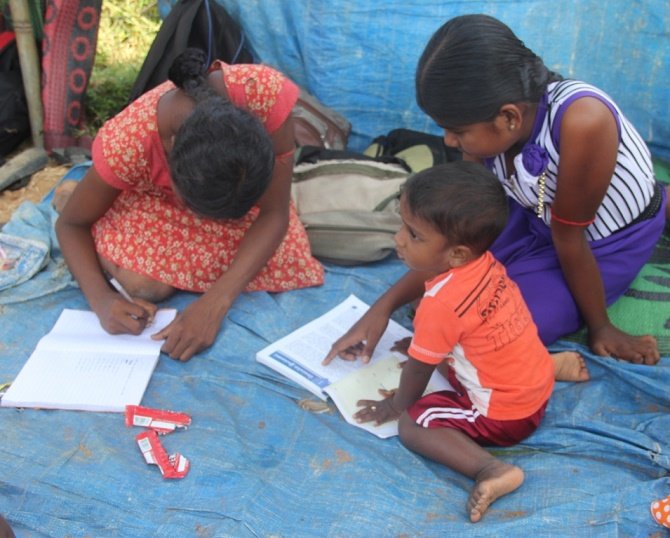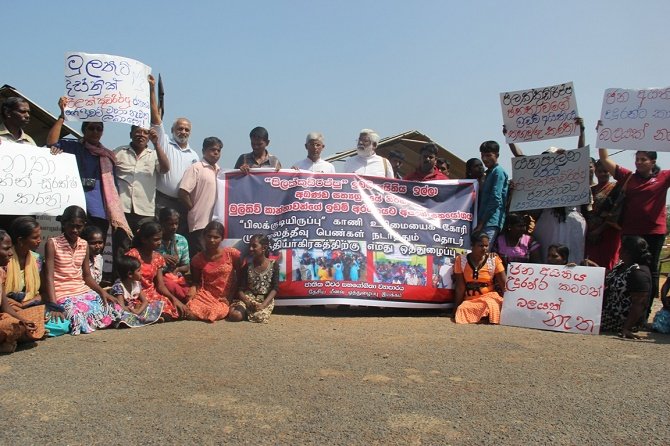Tamil protesters: 'We will sacrifice our lives'
UCA News - Niranjani Roland, Mullaitivu - Sat, Feb 25th 2017
They have been protesting for the return of their lands outside an air force base Tamil protesters: 'We will sacrifice our lives'

Kanchan Chandraleela, president of the Keppapulavu Women's Rural Development Society, at a protest about land grabs in Pulakudiyiruppu, Sri Lanka on Jan. 9. (Photo by Niranjani Roland)
For over 20 days Kanchan Chandraleela has campaigned outside an air force base in Pulakudiyiruppu in Mullaitivu for the return of land stolen by the Sri Lankan military. Some 385 families from local villages have joined her to demand the return of a total of 212 hectares.
"We lost our loved ones, belongings and now our lands," said Chandraleela, the president of the Keppapulavu Women's Rural Development Society.
Chandraleela said that, in 2012, the government closed the Manik Farm refugee camp where she lived and relocated the community to a newly-built village in Sooriyapuram but they want to return to their own lands. "We had several protests demanding that we be resettled on our own land but none of them heard us," she said.
"The government made a model village with 384 houses at Sooriyapuram. But we have only 10 wells and four tube wells for all 384 families and we don't have proper toilet facilities," Chandraleela said.
The government had informed the villagers that the Sri Lankan president would come and release the land of 84 families but he did not come.
"We were displaced and detained in the refugee camp and then resettled in the model village in 2008. We don't have any facilities there," said Jegan Rita, who used to live in Pulakudiyiruppu village.
"The government officials promised to hand over our land on Jan. 31 but nothing has happened and so we have decided to protest," she said.
Rita walks 3 kilometers every day to get to her job as a farm hand. She said that if her land was released she could double her income by reviving her agriculture and fishing activities.
"I work in the paddy fields and earn 700 rupees per day (US$5). We cultivated vegetables, chilies, coconut trees and had paddy fields in our former land," said Rita, "The sea is only 1 kilometer from our old village but from the model village it's 8 kilometers. We have a house but no livelihood opportunities in the model village."
"Now we have to pay 70 rupees for a coconut but the military enjoys all our coconuts, mangoes, rice and fish," said Rita.

There are 54 children who have missed school due to the protest. These three children concentrate on their studies at a temporary hut at the protest in Pulakudiyiruppu on Jan. 9. (Photo by Niranjani Roland)
No education
The protesters say they had to bring their children with them so now they are missing school.
"How can we send our children to school? If they are alone in the model village while we are all here there is a major problem for their security," said Rita.
"Some volunteers and four teachers from the Mullaitivu Department of Education visit the protesters in the afternoon to teach 54 children who have been missing their lessons over the last 20 days," said Rita.

Staff from the National Fishery Solidarity Movement in Negombo, priests and nuns show their solidarity with the protesters in Pulakudiyiruppu, Sri Lanka on Jan.9. (Photo by Niranjani Roland)
Solidarity protests
Several groups organized solidarity protests nationwide including the National Fisheries Solidarity Movement, All Island Teachers' Union, student unions and the Christian clergy who showed their support by visiting families. Well-wishers have provided food, pillows, mats, sheets and toiletries to help them keep going.
Jesuit Father Elil Rajan, a rights activist, said that the people of Keppapulavu have been the victims of the country's past civil war for long time. They are sick of broken promises.
"Land grabbing and encroachment is part of a political project that is screening people out of Sri Lanka since its independence, it is part of a genocide process," said the priest.
"This issue should not be considered in isolation but part of the Tamil's struggle in Sri Lanka and the solution should be part of a solution for all their problems.... These people have the deeds for their land so the government can't refuse their demands," said Father Rajan.
The Tamil People's Council, consisting of academics, religious leaders, members of civil society and politicians, issued a statement.
"There are 66,000 acres of land grabbed in the Northern Province.... The United Nations and the international community should pressure the Sri Lankan government to release the land and resettle the people very soon," they said in a Feb. 16 statement.
"The former government promised the U.N. that they would resettle the people in their own lands but they resettled the people at a model village in the jungle," the statement said.
Watch the above ucanews.com video that features the protesters' camp outside the air force base.
Prison Reforms, Rehabilitation, Resettlement and Hindu Religious Affairs Minister D. M. Swaminathan that that he discussed the issue with President Maithripala Sirisena and would have a solution soon.
Kanchan Chandraleela said that almost six generations of Tamil people lived on the land before it was stolen from them. "In the last stage of the war in 2009, we suffered a lot and lost lives and lived with bombs but unfortunately, we still suffer," said Chandraleela. "We will continue our protest until we get back our lands and are even ready to sacrifice our lives if they are not returned."
share :


 Votes : 0
Votes : 0









